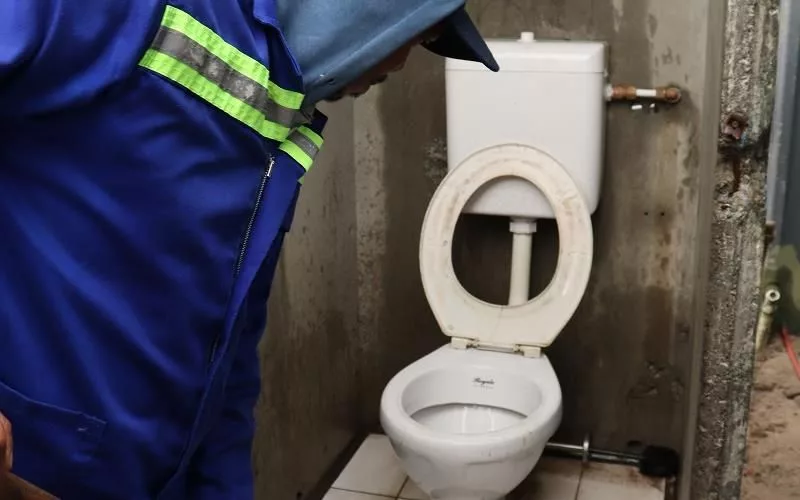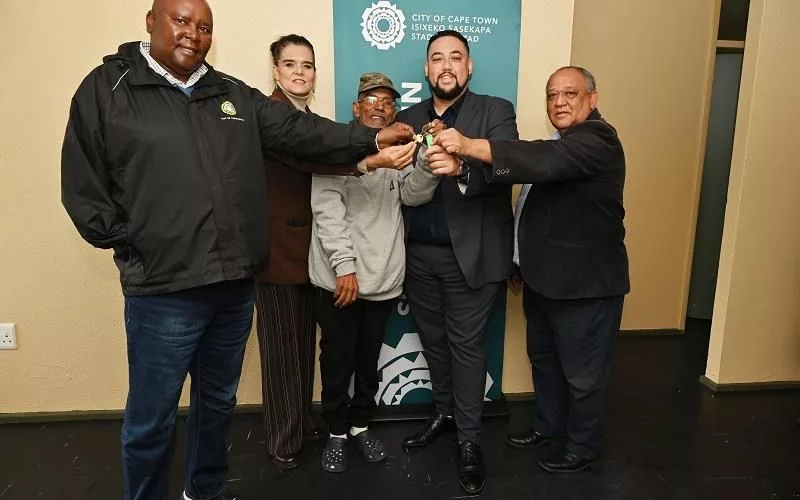In Cape Town, the Water and Sanitation Directorate is facing a crisis as workers responsible for providing clean water and sanitation solutions are being threatened by criminal activity. In the preceding fiscal year, there were 22 hijackings and 52 robberies reported, causing a financial burden of R8.5 million in private security escorts to ensure personnel safety and continuity of services. The Mayor has launched an Anti-Extortion Campaign, and Councilor Zahid Badroodien is calling for community cooperation to guarantee safer working conditions for essential workers, emphasizing the need for collective action to protect public service providers.
The City of Cape Town’s Water and Sanitation Directorate is facing an unsettling rise in criminal incidents, with 22 hijackings and 52 robberies reported in the preceding fiscal year. This has led to a financial burden of R8.5 million in private security escorts to ensure personnel safety and continuity of services. Mayor Geordin Hill-Lewis launched an Anti-Extortion Campaign and Councilor Zahid Badroodien advocates for community cooperation to guarantee safer working conditions for essential workers. The call for collective action aims to protect public service providers and ensure uninterrupted provision of crucial services.
Underlying Issues in the Mother City
The serene facade of Cape Town, fondly known as the Mother City, conceals an alarming reality. An unspoken crisis is budding within, placing the city’s unsung heroes – the workers who ensure the city functions seamlessly – in grave danger. Their daily encounters with threats hamper both their personal safety and the efficient delivery of vital city services. The brunt of this crisis is borne by the industrious employees of the City’s Water and Sanitation Directorate, who bear the responsibility of providing clean water and sanitation solutions. Unfortunately, a relentless wave of crime has put their security at stake, disrupting essential services, and causing escalating unrest among the community.
Surges in Crime and Its Impact
The preceding fiscal year has seen an unsettling rise in criminal incidents involving Water and Sanitation staff. From July 1, 2023, the department has reported 22 hijackings and 52 robberies, illustrating the grim reality confronting these committed public servants. High-risk zones like Khayelitsha, Philippi, and Mfuleni are the focal points of hijackings, while robberies, including 16 at gunpoint, have occurred in various places, often robbing workers of their vital service tools.
However, the consequences of these criminal activities are not limited to numbers alone. Each episode represents a person plunged into a vortex of fear and insecurity. The stolen items are not just mobile phones, wristwatches, meter-reading devices, tablets, and personal protective gear. More importantly, it is the workers’ sense of safety and their mental health that is being robbed. Furthermore, the tragedy unfolds further as the lives of security personnel assigned to these teams have been abruptly ended, as evidenced by recent incidents in Philippi’s Phola Park and Athlone.
Financial Burden and Initial Response
As a direct reaction to this escalating crisis, the City was compelled to redirect a substantial R8.5 million from public funds for private security escorts during the 2023/24 fiscal year. Despite the sizable monetary strain, this expenditure is deemed necessary to ensure the security of the personnel and the continuity of water and sanitation services.
Cape Town’s administration, led by Mayor Geordin Hill-Lewis, refuses to remain a passive observer in the face of this dire crisis. Adopting a firm approach against this rampant extortion, the Mayor launched an Anti-Extortion Campaign, rallying citizens with the compelling catchphrase, ‘Enough is Enough! Genoeg is Genoeg! Kwanele!’ This program encourages locals to actively participate in the fight against crime by reporting suspected extortion activities through a 24-hour hotline and email system, supplementing the city’s endeavors to curtail this growing problem.
Call for Collective Action
Recognizing that the city’s administration cannot singlehandedly handle this issue, Councilor Zahid Badroodien, the Mayoral Committee Member for Water and Sanitation, advocates for a collaborative effort involving residents, businesses, and community leaders. He underscores the need for community cooperation to guarantee safer working conditions for the Water and Sanitation staff, which in turn minimizes service disruptions and enhances safety in high-risk zones.
The profound impact of crime on the city’s Water and Sanitation staff resonates as a compelling call for effective measures to protect public service providers. Their safety and mental health are not just personal matters; they are fundamental to the uninterrupted provision of crucial services that profoundly affect public health and the overall quality of life in Cape Town. This situation necessitates a collective response, echoing the Anti-Extortion Campaign’s sentiment: Enough is Enough.
1. What is the crisis currently facing Cape Town’s Water and Sanitation Directorate?
The Water and Sanitation Directorate is facing a crisis caused by rising criminal activity, including hijackings and robberies, which is threatening the safety of their workers and the continuity of services.
2. How many hijackings and robberies were reported in the preceding fiscal year?
The preceding fiscal year saw 22 hijackings and 52 robberies reported, causing a financial burden of R8.5 million in private security escorts to ensure personnel safety and continuity of services.
3. What is the impact of the criminal activity on Water and Sanitation workers?
The criminal activity is not only resulting in stolen items such as mobile phones, wristwatches, and service tools, but it is also robbing workers of their sense of safety and mental health, plunging them into a vortex of fear and insecurity.
4. What is the Anti-Extortion Campaign launched by Mayor Geordin Hill-Lewis?
Mayor Geordin Hill-Lewis launched an Anti-Extortion Campaign aimed at rallying citizens to actively participate in the fight against crime by reporting suspected extortion activities through a 24-hour hotline and email system.
5. What is Councilor Zahid Badroodien calling for to guarantee safer working conditions for essential workers in Cape Town?
Councilor Zahid Badroodien is calling for community cooperation to guarantee safer working conditions for essential workers, emphasizing the need for collective action involving residents, businesses, and community leaders.
6. Why is collective action necessary to protect public service providers in Cape Town?
Collective action is necessary to protect public service providers because their safety and mental health are fundamental to the uninterrupted provision of crucial services that profoundly affect public health and the overall quality of life in Cape Town.









